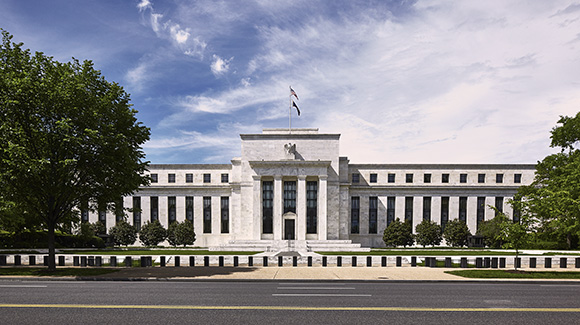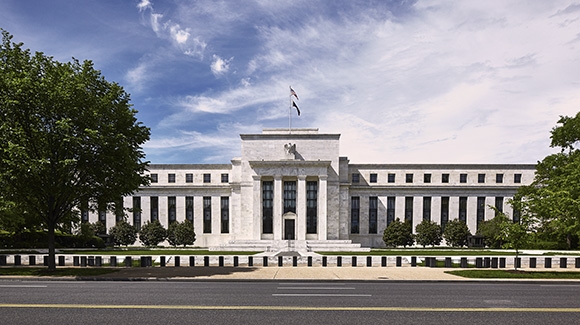Broaden your mind, narrow your search
-
Market Watch: Inflation Surge - Investor Insights
In this edition of Market Watch, Shamik Dhar, Chief Economist at BNY Mellon Investment Management, presents an alternative perspective on the prevailing soft landing disinflationary world narrative. He discusses the potential emergence of a second wave of inflation and its implications for investors as outlined in his recent economic outlook Vantage Point.
-
Bond market adjusts rate expectations
Newton head of mixed assets investment Paul Flood considers how the bond market has reacted to central bank policy decisions.
-
Mixed economic signals puzzle fixed income investors
As central banks work to tackle inflation just how healthy are the prospects for European credit markets?
-
Pivotal moments
Economists and portfolio managers from BNY Mellon Investment Management share ‘pivotal moments’ of recent years and how they have influenced macroeconomic and market trends
-
Equity investors navigate pivotal change
Walter Scott’s Alan Edington outlines the pivotal issues facing equity markets and explains why he thinks certain companies could weather potential consequences.
-
Foraging for high yield advantage
Can a short-dated approach to high yield offer investment advantages?
-
A new spark for clean hydrogen?
How the US Inflation Reduction Act could provide the policy support needed to boost the viability of clean hydrogen.
-
Can impact bonds become an EM game changer?
Emerging market impact bonds look set for major growth and could bring a range of positive outcomes for EM countries.
-
What’s next for global credit markets?
Why the return of sustained inflationary pressures and higher interest rates has buoyed credit markets in sectors such as investment grade.
-
Wolters Kluwer: overcoming disruption
Walter Scott client investment manager Murdo MacLean explains why he thinks Dutch information services business Wolters Kluwer is always moving with the times.
-
Weighing the fixed income advantage of UK corporates
Can UK corporate bonds offer light among the gloom?
-
The company powering AI
Walter Scott client investment manager George Dent explores what he sees as Dutch company ASML’s integral role in the semiconductor ecosystem.
-
AI equity impact: already irrational?
Speculation on the influence of artificial intelligence (AI) pervades every corner today. Few industries seem untethered from its potential impact, likewise global productivity. BNY Mellon’s Global Economics and Investment Analysis (GEIA) team outlines its view on the economic implications of the new technology wave.
-
What could disrupt a soft landing?
Newton FutureLegacy portfolio manager Lale Akoner considers how the strategy is positioned to weather upcoming macroeconomic events.
-
The importance of quality
Walter Scott client investment manager George Dent considers the macroeconomic backdrop in 2024 and what pressures companies could face.
-
Exploring opportunity: Short Dated High Yield Q&A
Insight portfolio managers weigh the pros and cons of short dated high yield bond investment
-
Are we heading for a fixed income renaissance?
BNY Mellon Investment Management chief economist Shamik Dhar looks at key macroeconomic drivers which could buoy fixed income markets in the years ahead.
-
Recharging the EV trade
Why the electric vehicles (EVs) trade could be set for a boost – and why Newton is well prepared to explore this and other alternatives markets.
-
Women in finance
This interactive report explores the evolution and future of women's wealth and features key voices from across BNY Mellon.
-
Thematic tailwinds in a big year for elections
Newton head of mixed assets investment Paul Flood assesses some of the investment opportunities and themes stemming from this year’s global elections.
-
Mettler Toledo: a picture of consistency
Walter Scott client investment manager Murdo MacLean profiles Mettler Toledo, a Swiss-headquartered, US-listed manufacturer of precision weighing and analytical equipment.
-
Finding value away from the herd
Newton US equity income portfolio manager John Bailer explains why he thinks it could be sensible to look outside the index in the US equities market.
-
Building resilient multi-asset portfolios
Why identifying companies with quality attributes, and revisiting the true reason why people invest, can help build resilient multi-asset portfolios.
-
Limited resilience: the right risk for retirement
Nobody wants to see the value of their retirement savings fall, no matter where they are in their investment journey. What does limited resilience mean when it comes to retirement clients?
-
Short-dated high yield: the importance of excess spread
When looking at high yield investments, excess spreads are a more important metric than market spreads, says the Insight Investment team.
-
Market divergence widens fixed income opportunity
Can fixed income investors benefit from credit market normalisation and heightened volatility?
-
Have rate cuts been priced in too keenly?
Newton head of mixed assets investment Paul Flood considers whether the bond market has been too aggressive pricing in interest rate cuts so far this year.
-
Davos discussion: Does finance benefit people?
Greater participation in capital markets is vital to engendering trust in financial services, according to BNY Mellon CEO Robin Vince.
-
Finding value in shifting fixed income markets
Why elevated bond yield levels could augur well for fixed income investors in 2024 despite heightened market volatility.
-
Is global credit returning to form?
Why global credit is looking potentially more attractive to some investors now than at any stage over the last 15 years.
-
Navigating shifting global equity markets
Finding long-term opportunity in global equity markets.
-
Walter Scott celebrating 40 years
As Walter Scott marks its 40-year anniversary Jane Henderson, Managing Director, reflects on how the firm has evolved whilst also maintaining its ethos that patience, continuity and a long-term mindset are the hallmarks of a great company.
-
Time to get tactical?
The Newton FutureLegacy team reflects on sources of macroeconomic uncertainty and why it thinks tactical asset allocation is crucial in the current environment.
-
Newton shows optimism on UK equities
Newton UK income portfolio manager David Cumming explains why he is optimistic on the prospects for the UK equities market.
-
Are GEM equities facing better prospects?
Newton head of emerging markets and Asia equities Liliana Castillo Dearth explains why she thinks the year ahead looks promising for emerging market equities.
-
Are markets ripe for value investing?
How the economic impacts of deglobalisation, normalizing interest rates and the return of inflationary pressures could help value investors.
-
Which way next for multi-asset?
How a shifting inflationary picture is influencing asset classes and portfolio management.
-
Meet the team: Newton Global Equity Income
Learn about what James Lydotes, Jon Bell and Rob Hay do at Newton and their route into investment management.
-
Meet the manager: Ella Hoxha
Newton Investment Management head of fixed income, Ella Hoxha, discusses her route into asset management and investment style.
-
Is luxury’s post-pandemic boom over?
Walter Scott investment manager Lindsay Scott assesses Europe’s luxury goods sector in the face of growing macro headwinds.
-
Face to face with: Fabien Collado
Weighing the pros and cons of European impact bond investment
-
New horizons: Market outlooks report 2024
Read investment outlooks for the year ahead from our investment managers and specialists.
-
Could high yield bonds prove an investment blessing?
Looking beyond investment grade in fixed income portfolios
-
Bond yields a boon for Asian income?
Higher bond yields and interest rates could make equity income an attractive prospect, especially in areas of Asia, according to Newton income portfolio manager Alex Khosla.
-
Face to face with: Simon Cooke
An interview with Simon Cooke, portfolio manager, emerging market fixed Income, Insight Investment
-
How important is face-to-face research for you?
Murdo Maclean, client investment manager, discusses how Walter Scott's research process emphasises face-to-face meetings which is an important tool to inform the strategy for the longer-term.
-
Leading the Way
The combination of growth and resilience are attributes highly sought after by investors. In the form of the BNY Mellon Global Leaders Fund, Walter Scott1 has created exactly that. George Dent, investment manager at the firm, looks at what helps its strategy stand out from the crowd.
-
What is the current market outlook for long-term equities?
George Dent, client portfolio manager at Walter Scott, explains that while the market outlook hasn't changed much, with higher rates and lower growth, there are still businesses that can perform better, relative to their peers.
-
What do the markets mean for you as a long-term investor?
Murdo Maclean, client portfolio manager at Walter Scott, reviews equity markets and what they might mean both for investors and consumers.
-
Semi-conductors and healthcare
Murdo Maclean, client portfolio manager at Walter Scott, discusses two key areas of interest for the portfolio
-
Animals of Investing
From cats to bulls - animals are used to explain investor sentiment, types of markets and stocks. Check out our infographic explanation of beasts that inhabit the investing world.
-
Powering nickel’s growing demand
As the push for renewables and electric vehicles grows, so does the need for metals like nickel. Learn more in Marketeye.
-
Demographic Dilemma
With life expectancy increasing and fertility rates decreasing, the world is experiencing a shift in population structure. See how the change in demographics could impact society.
-
Back to the 70s?
Flashback to the 70s! Newton portfolio manager Andy Warwick believes we’re in for a decade of price instability, heightened geopolitical risks and volatility. Find out in MarketEye.
-
The rise of AI
View this infographic to discover the key facts around the adoption of artificial Intelligence.
-
A bargaining chip for the US
Semiconductor chips are central to the global economy – and sit at the centre of a technology battle between the US and China. Where is demand highest? Find out in Marketeye.
-
US onshore manufacturing on the rise
The US could see a resurgence of global industrial production over the next 10 years. What does it mean for investment opportunities? Check out our latest MarketEye for more.
-
Urge to splurge
While recession fears may have some tightening their purse strings, others are spending big on high-end goods. Learn more about luxury shopping trends in our latest MarketEye.
-
Fixed Income investors eye net zero transition
Newton Portfolio Manager Scott Freedman explains why Fixed income investment will be a key to the success of funding the transition.
-
Are bonds good value now?
After a rough year for global bond markets – one of the worst in recent history – has value returned to the asset class? Managers across Newton and Insight along with BNY Mellon IM’s economist team outline their views.
No more posts to show




























































